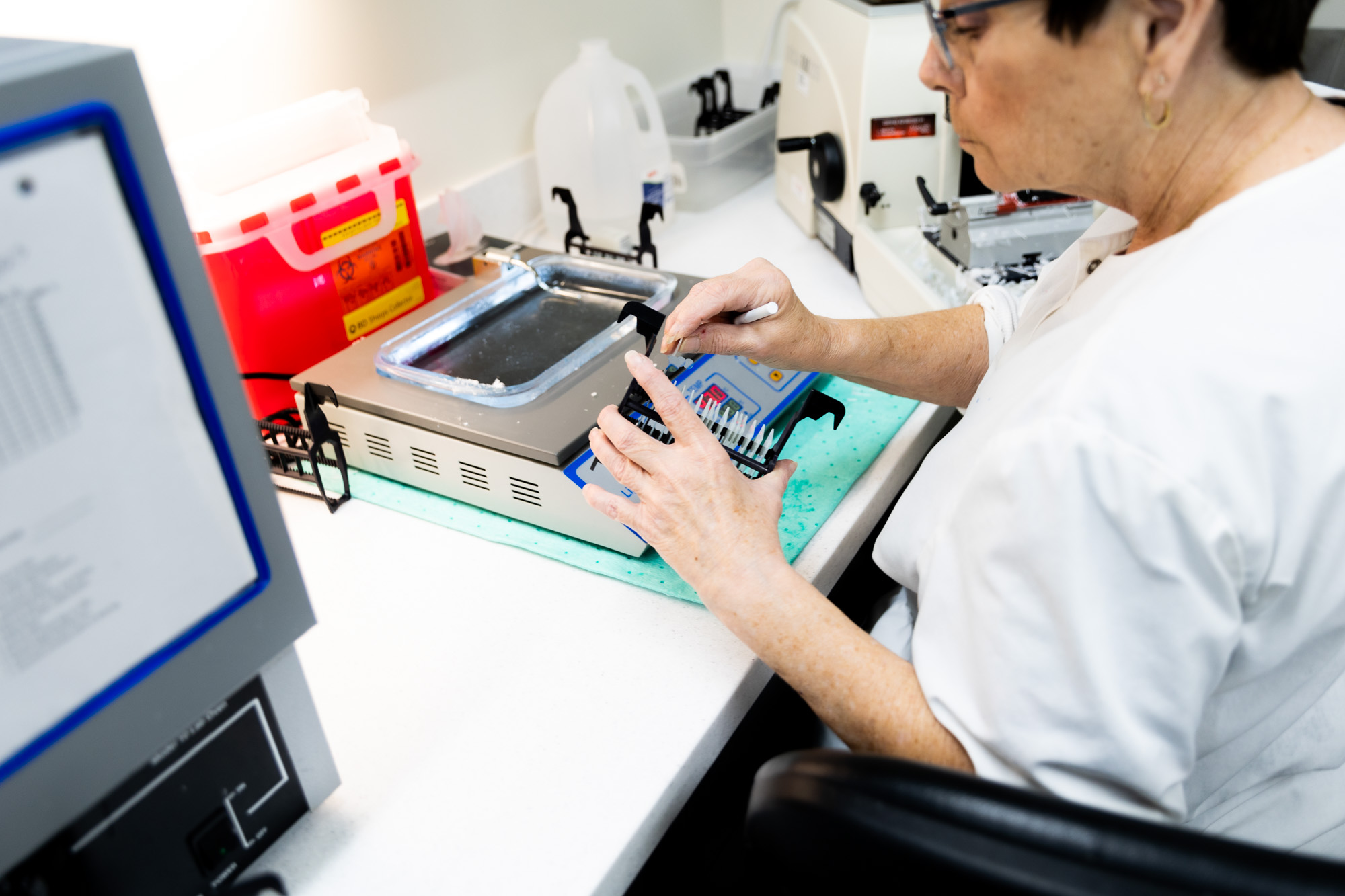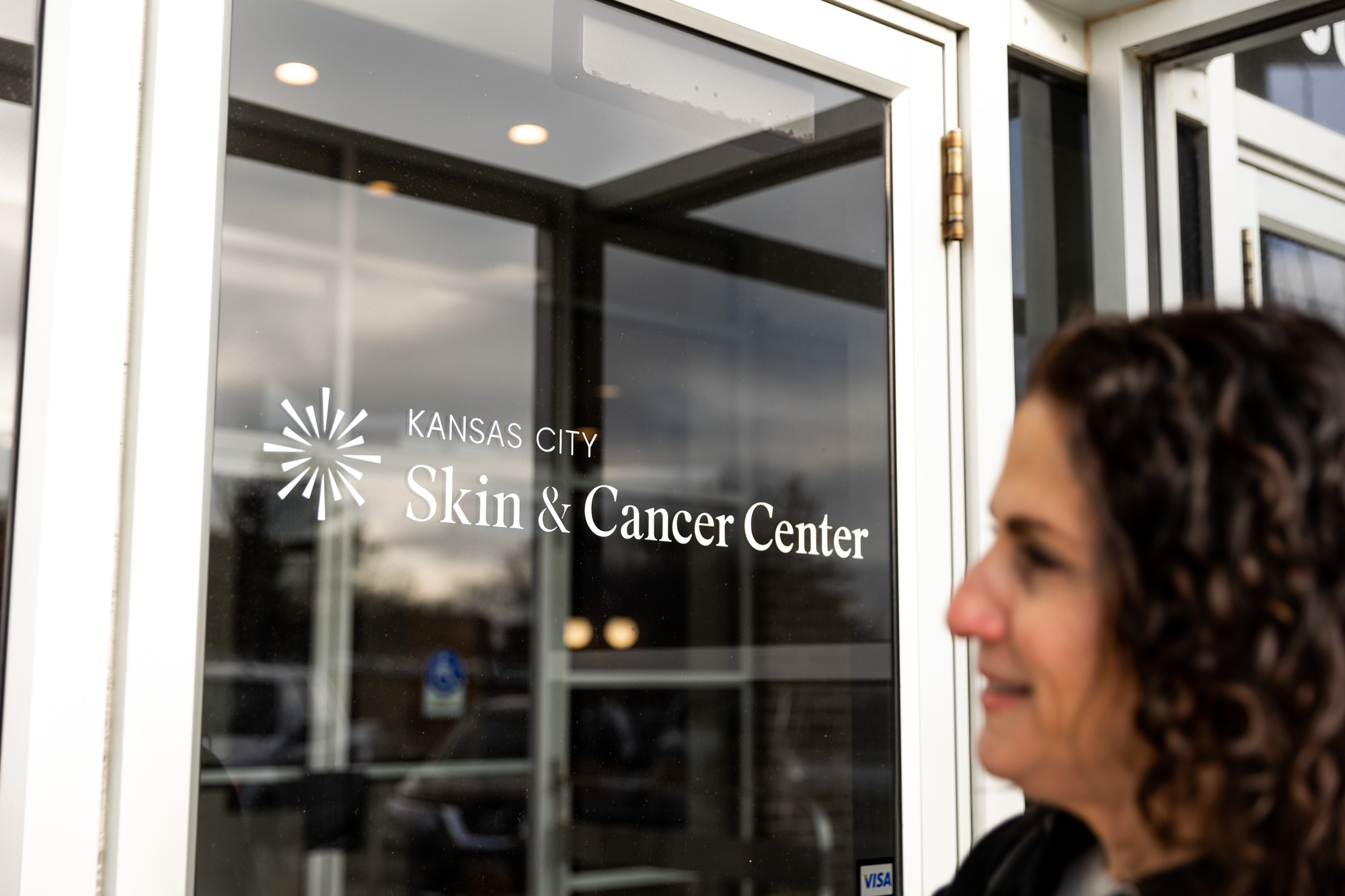Do you ever wonder what happens to a mole sample taken from your arm once the doctor leaves? And what about when some tissue is obtained from under the skin’s surface through a syringe to be tested—where does that go? The answer lies below in this blog all about skin doctors in KC!
The Difference
Dermatology V. Pathology
Dermatologists are the specialized medical professionals who you turn to when you have concerns with your skin, hair, or nails. They can give you their best educated guesses when it comes to a diagnosis and reason for your symptoms. But in order to get the most certain answer, they will then send their notes to a pathologist, along with a skin, cell, or tissue sample.
So they are now working together to come to a conclusion. The pathologists work behind the scenes, performing lab tests to examine the samples, while dermatologists work directly with patients to evaluate the concerns still on a patient’s body. While certain conditions can be treated without need of lab work or a pathologist, a dermatologist will often send in a sample in order to make the most accurate diagnosis, especially when a patient’s concern could be related to something more serious, such as a type of skin cancer.
About Pathology
What They Do
Pathologists are physicians and doctors who do their work behind the scenes, while dermatologists are the ones in the forefront. Pathologists are the doctors who do work under microscopes, looking at cells and tissue to make a diagnosis. They study samples of a concerning area biopsied from patients, sometimes done by nurses or nursing assistants, and then inspect these samples on slides in great detail. A vast majority of a pathologist’s work is done behind the curtain, and you’ll often have results from your biopsy within a few business days.
Pathology involves a more scientific look at medicine. While dermatology looks at the surface of the skin and assesses what could be the problem or diagnosis, pathologists look into the reasons why something is so to get precise answers. By determining what the situation is with a tissue sample, that information can then be used to make a proper diagnosis for the patient, which can then lead to proper treatment.

While it is a more solo approach to practicing medicine, they do interact with many throughout the day. They often need to obtain a sample from a patient’s area of concern when a nurse is not qualified for a particular procedure, and in those cases will then interact with patients. But most of the time, a dermatologist will send a tissue sample over to a pathologist, whether they are in the same office/center or not. Either way, dermatologists and pathologists work together to reach a conclusion, combining the evidence both on and below the skin to give the best recommendations to a patient.
How does one become a skin doctor?
Typically, pathologists require 11 to 12 years of education before entering their field. This includes 4 years of college, 4 years of medical school, and 3 to 4 years of a residency. Of course, with a heavy load of summer courses and diligent work, the program can be finished somewhat sooner, but not by much. It’s an investment of both your money and your time. But here at Kansas City Skin and Cancer Center, we think all that work is absolutely worthwhile. Those who choose a medical specialty as a profession see the benefits that come with putting so much time into an academic path.
Once you have that medical degree with a focus on skin medicine, there are many career choices for a pathologist! Some options include…
- Professors
- Researchers
- Forensic investigators in law enforcement
- Public or private lab work
- Veterinary pathology
Addressing Misconceptions
Pathologists don’t have to interact with people
For the reasons mentioned above, pathologists will interact with patients when they need a certain kind of sample (i.e. such as doing fine needle aspiration to get deeper tissue than just skin level).
And, of course, they also interact and collaborate with fellow pathologists in the lab.They do work in teams with other pathologists, assistants, biologists, and others. So they don’t choose this job simply because they don’t like people. It is a team-oriented job, and they often need other opinions and people to bounce ideas off of in the lab, and they talk with dermatologists too!
Dermatologists and pathologists are the same thing
Aside from the many reasons mentioned above as to why they are different, there is one more thing that separates them. The meaning of dermatology is the study of skin, and the meaning of pathology is the study of disease. Pathologists who specialize specifically in diagnosing concerns with the skin, hair, and hails are called dermatopathologists. So while dermatologists and dermatopathologists do work hand-in-hand and are both considered skin doctors in Kansas City, they have different areas of expertise that are distinguished by their titles.
Dermatologists only see people with serious and fatal conditions
No, this is not true at all! Dermatologists and pathologists help with all sorts of skin concerns. Of course, they consider it a privilege to be able to help those who are diagnosed with skin cancer, as helping someone beat their cancer is one of the most rewarding experiences.

But they also treasure being able to help people in their acne, mole, hair, and nail concerns! Physicians in the skin care field help all sorts of patients with their unique concerns, even with aesthetic matters. They understand that, no matter if a skin condition is fatal or not, it still affects your daily life. They are here to help!
Pathologists only work in labs
While they do spend much of their time in labs looking into samples, they also can join or replace a dermatologist in an appointment for more complex cases where they would rather explain a diagnosis than just hand off a written and transcribed treatment plan. So they do come out of labs from time to time, but their specialty knowledge happens behind the scenes with the help of a microscope.
They only work on cancer cases
While diagnosing cancer is an important part of pathology, it isn’t the only focus of their field. Pathologists also study a wide range of other diseases, including infectious diseases as well as autoimmune and genetic conditions. Pathologists are often involved in the diagnosis of rare diseases, and their expertise is critical in identifying these conditions correctly.
They only do biopsies
While it is true that pathologists and dermatologists do biopsies, they don’t need to do them all the time, and it definitely doesn’t have to be their whole job. The amazing thing about being a skin doctor in Kansas City is that there is so much flexibility and such a wide range of career opportunities.
For example, a pathologist could choose a job where they would never need to do a biopsy, or they could choose one where they do a biopsy occasionally as part of a range of other duties. Other opportunities will have biopsies as the main portion of their regular workload. There are a range of options available for pathologists, allowing someone to find what best suits their preferences.
Pathologists are the nerds of the medicine field
Hmmmm, well this one may be a little true actually. Of course that is meant in the nicest way possible! Pathologist’s are in one of the hardest areas of medicine. They have so many variables and potential diagnosis to consider when examining a sample. So props to them for all the work they do! So they may be called the nerds of the medicine arena, but we think that’s a compliment.
About KCSCC
Our Expertise
You simply cannot find skin doctors in Kansas City with this level of commitment or qualification anywhere else—and we’re determined to make sure our team leads the way in patient-centered skin care. When you work with our physicians or advanced practice providers, you are receiving care from a physician-led team that recognizes the uniqueness of your skin. No two patients are quite the same, and no two patients should receive cookie-cutter treatments or support.
Kansas City Skin & Cancer Center works diligently to remain at the forefront of technological advances in skin care and cosmetic procedures, as well as the best training and techniques to deliver that care.
Happy Patients
We have been serving the Kansas City area for decades and have built quite the reputation among the dermatology and cancer fields for our diligence to patients and excellent treatment offers. We are so very grateful for all of the amazing reviews we have received complimenting our staff and doctors; it keeps us going and continuously motivates us to serve all who walk through our doors with any skin concerns so we can be their skin doctor in Kansas City.
Discover freedom from your skin concerns today with Kansas City Skin and Cancer Center!
We hope we helped shed some light on the differences between and purpose of pathologists and dermatologists. Taking care of your skin is more than just cosmetic and skincare products (we do have these, too, though!)

A common obstacle we’re aware of is how long it can take to get an appointment with a trusted laser specialist. Rest assured that at Kansas City Skin & Cancer Center, we will get you in our office within a week! Whether you have a specific issue or general concerns, you can count on a timely appointment.
More Information
We have plenty of resources on our site, including FAQs, patient paperwork, insurance information, and educational reading sources.
Contact Us
Submit a contact form or pick up the phone and call us here!